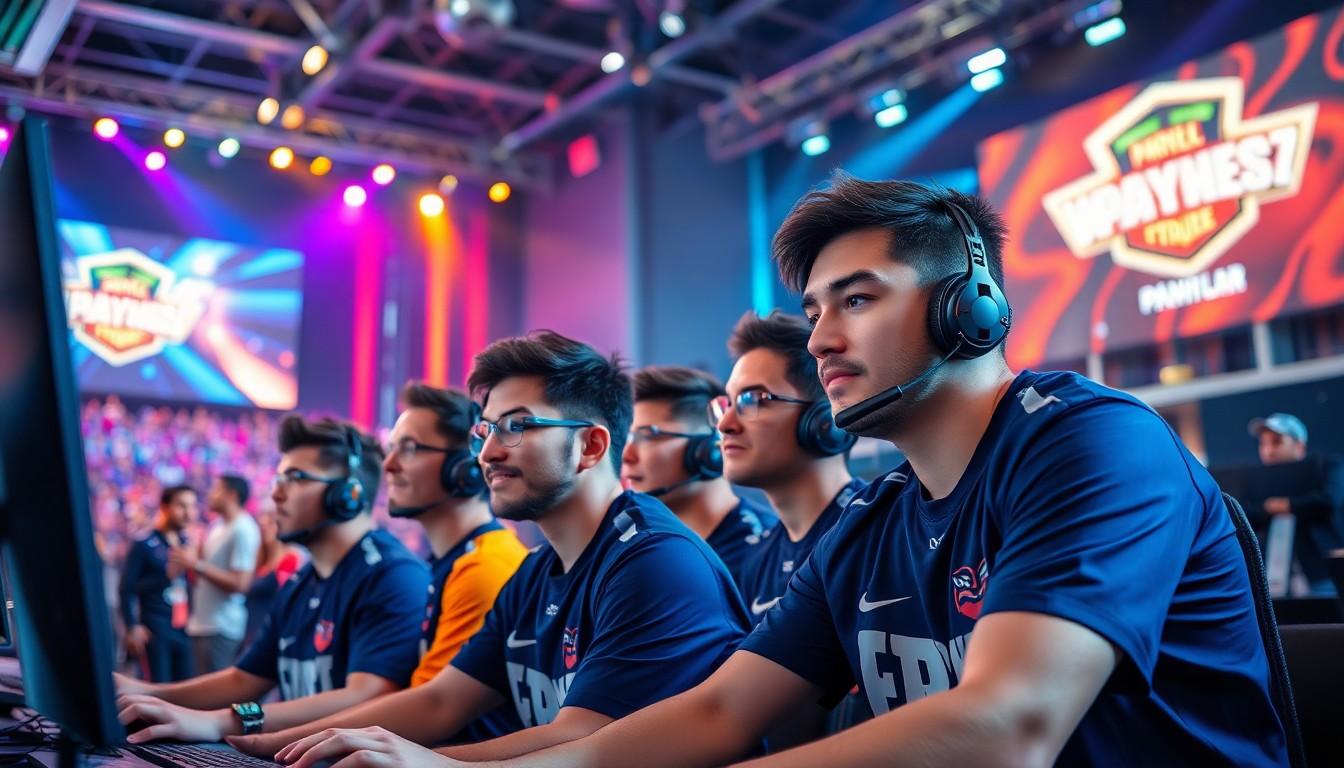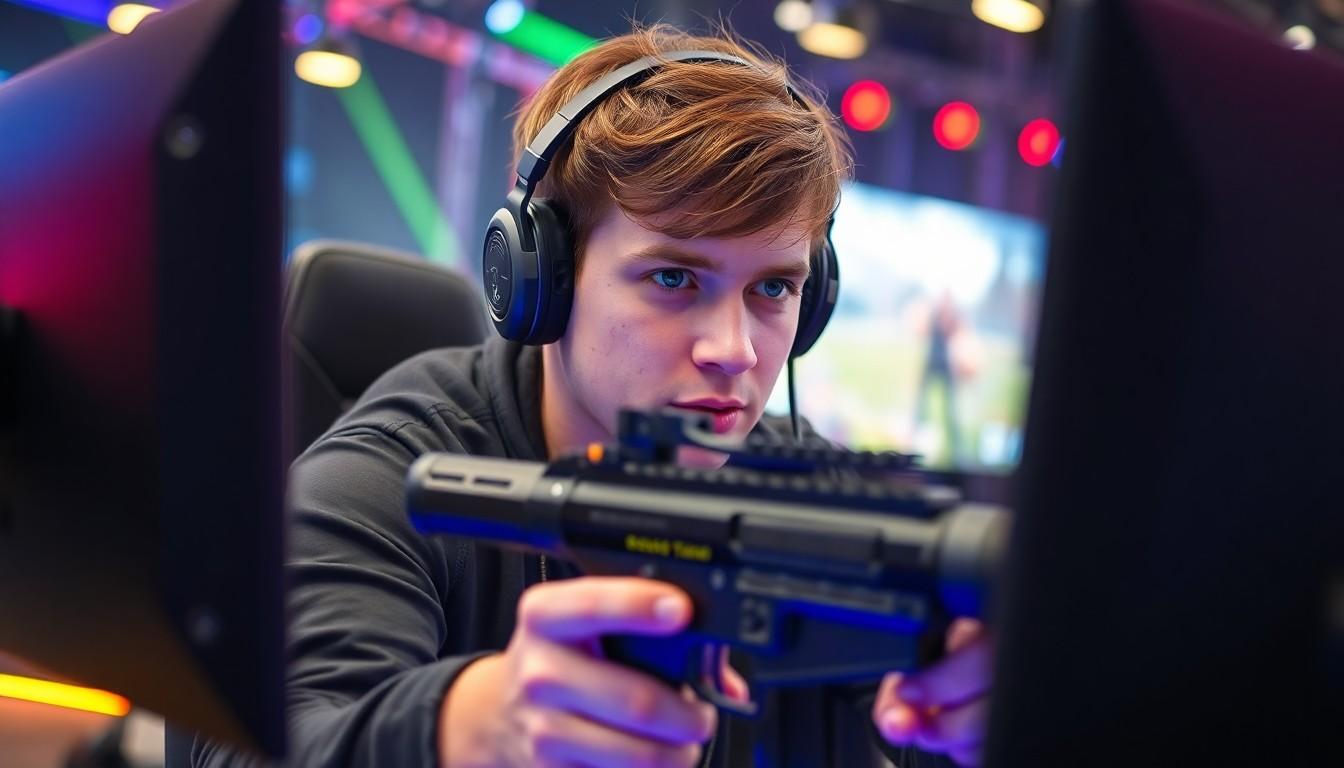In the ever-evolving world of gaming, competition isn’t just a buzzword; it’s the lifeblood that fuels the passion of players everywhere. From heart-pounding battle royales to strategic team-based shooters, the top competitive games are where skill meets adrenaline. Whether you’re a casual player or a seasoned pro, there’s something thrilling about outsmarting your opponents and claiming victory.
Imagine diving into a virtual arena where reflexes are tested, teamwork is essential, and every match could be the one that turns you into a legend. These games don’t just offer entertainment; they create communities, rivalries, and unforgettable moments. So grab your controller, rally your friends, and get ready to explore the exhilarating landscape of competitive gaming that promises to keep you on the edge of your seat.
Top Competitive Games
Competitive gaming serves as a vibrant arena where players showcase their skills and strategies. Various genres thrive in this landscape, from battle royale games to first-person shooters. Each game brings unique mechanics that challenge players to adapt and excel. Furthermore, teamwork often plays a crucial role, influencing match outcomes and player experiences.
Statistics reveal that millions participate in competitive gaming events globally. Tournaments attract top-tier talent, with prize pools often exceeding millions of dollars. These events foster a sense of community while providing a platform for aspiring players to gain recognition. Games like League of Legends and Dota 2 exemplify this competitive spirit, featuring complex gameplay that rewards strategic thinking.
Platforms for competitive gaming continue to grow. Streaming services and esports channels broadcast matches to fervent audiences, increasing game visibility and popularity. Social media plays a significant role in connecting fans and players, creating a supportive environment for discussions and sharing strategies. Excitement builds as rivalries intensify, with players often celebrated as sports icons.
Players benefit from an array of resources available for improvement. Online tutorials, practice servers, and mentorship programs enhance skills over time. Many communities also offer opportunities for players to compete at various levels, fostering growth and development. Inclusive environments ensure that newcomers find support as they navigate the competitive scene.
Competitive gaming isn’t just entertainment; it embodies culture, collaboration, and competition. Enthusiasts engage with diverse game titles, each with a thriving competitive scene. As innovation continues, competitive gaming evolves, captivating players and audiences alike.
Factors That Define Top Competitive Games

Top competitive games thrive on specific defining factors. These elements shape the gaming experience and influence player engagement.
Gameplay Mechanics
Effective gameplay mechanics are foundational in competitive gaming. Developers often prioritize balance, ensuring no single character or strategy dominates. Precision controls enhance player experiences, enabling quick reflexes during critical moments. High skill ceilings challenge players to master nuances and advanced techniques, leading to satisfying accomplishments. Regular updates and patches maintain fair competition, addressing issues that arise from player feedback. Examples include popular titles like Overwatch and Street Fighter V, where mechanics innovate while supporting competition.
Community and Esports Support
Community engagement significantly impacts the longevity of competitive games. Strong communities cultivate camaraderie among players, providing support and motivation. Dedicated esports organizations enhance visibility through tournaments, drawing in fans and aspiring players alike. Platforms like Twitch and YouTube amplify tournament reach, helping minor players gain recognition. Social media channels foster discussions, keeping players informed on strategies and events. For games such as Fortnite and Counter-Strike: Global Offensive, vibrant communities are essential, driving continuous interest and competitive opportunities.
Popular Genres in Competitive Gaming
Competitive gaming encompasses various genres that captivate players and foster engaging experiences.
First-Person Shooters
First-person shooters (FPS) remain a dominant genre, focusing on quick reflexes and precise aiming. Games like Call of Duty and Apex Legends highlight tactical gameplay and intense player-versus-player combat. Players work individually or in teams, emphasizing coordination and strategic planning. Fast-paced matches demand quick decision-making and adaptability. Tournaments often showcase top-tier talent, drawing large audiences and substantial prize pools. Community support enhances players’ experiences through guides, tutorials, and forums dedicated to skill improvement.
Multiplayer Online Battle Arenas
Multiplayer online battle arenas (MOBAs) like League of Legends and Dota 2 exemplify teamwork and strategy. In MOBAs, players control unique characters with distinct abilities, collaborating to outsmart opponents. Matches involve careful resource management, map awareness, and objectives beyond just defeating foes. Competitive leagues and tournaments elevate the genre’s profile, drawing large followings and significant sponsorships. Communities thrive on sharing tactics and strategies, enhancing player growth and engagement in this intricate genre.
Battle Royale Games
Battle royale games such as Fortnite and PUBG capture players with their unique survival mechanics. Each match begins with multiple players dropping into an expansive map, competing to be the last standing. Tactical decision-making and quick adaptation define success in this genre. Players often form temporary alliances, fostering dynamic interactions. Competitive events in battle royale games feature high-stakes situations, with substantial rewards for top performers. The genre continually evolves, introducing new features and game modes that keep players engaged and invested.
Notable Titles in Competitive Gaming
Several titles stand out in the competitive gaming landscape, each offering unique features and experiences that attract players worldwide.
Game 1: Overview and Features
League of Legends ranks among the most popular multiplayer online battle arenas. This game emphasizes strategic teamwork and player coordination. Champions each possess distinct abilities, fostering diverse playstyles. Players engage in intense 5v5 matches on a map known as Summoner’s Rift. The game features a leveling system that rewards skillful gameplay. Competitive tournaments often offer prize pools exceeding millions of dollars. The vibrant community surrounding League of Legends continuously supports player growth through frequent updates and content.
Game 2: Overview and Features
Counter-Strike: Global Offensive serves as one of the leading first-person shooters today. This title focuses on tactical gameplay and requires exceptional reflexes. Teams compete in various game modes, including bomb defusal and hostage rescue. Players can choose from a range of weapons and utilize strategy for map control. Events such as ESL Pro League attract global attention, featuring top-tier teams and substantial prize pools. The established esports scene ensures ongoing support and competition for players. Regular updates maintain game balance and keep the community engaged.
Game 3: Overview and Features
Dota 2 stands out as another acclaimed multiplayer online battle arena. This title emphasizes individual skill and teamwork through its complex mechanics. Players control unique heroes, each with distinct abilities, aiming to destroy the enemy’s Ancient. The game is known for its deep strategic elements and resource management. Competitive events like The International feature staggering prize pools, often reaching over $40 million. Community-driven support fosters an environment where newcomers can thrive. Periodic updates introduce new heroes and gameplay features, ensuring continual evolution.
The Future of Competitive Gaming
Competitive gaming continues to evolve rapidly, driven by advancements in technology and a growing audience. Immersive experiences enhance gameplay, making titles increasingly engaging for players. Games that incorporate virtual reality and augmented reality will likely attract more participants as they blend physical and digital worlds.
Esports leagues are expanding, with more organizations investing in talents and events. Opportunities for sponsorships are rising, leading to greater financial rewards for players. This trend highlights the potential for long-term careers in competitive gaming, appealing to aspiring gamers.
Community-building efforts also play a significant role in the future of competitive gaming. Stronger connections among players foster collaboration and learning. Online platforms for discussions and competitions create inclusive environments that welcome newcomers.
Tournament structures are becoming more accessible, encouraging more players to participate. Game developers are prioritizing audience engagement by hosting regular events, which boosts interaction with fans.
Cross-platform play is increasingly standard, allowing players from different systems to compete. Harmonizing gameplay experiences enhances competition and widens the talent pool.
Data analysis is here to stay, providing gamers with insights as they refine their strategies. Utilizing metrics for performance improvement allows players to understand their strengths and weaknesses better. As the competitive gaming landscape grows, innovation and adaptability will remain crucial for success.
Collaboration and Competition
Competitive gaming stands as a vibrant and evolving landscape that captivates players and audiences alike. With its blend of skill strategy and community support it fosters an environment where legendary moments and fierce rivalries thrive. As technology advances and new genres emerge the future of competitive gaming promises to be even more exciting.
Players can look forward to innovative experiences enhanced by immersive technologies and expanding esports opportunities. The dedication of communities and the continuous push for inclusivity ensure that competitive gaming remains a welcoming space for newcomers and veterans alike. Engaging with this dynamic arena not only offers thrilling gameplay but also a chance to be part of a cultural phenomenon that celebrates collaboration and competition.








